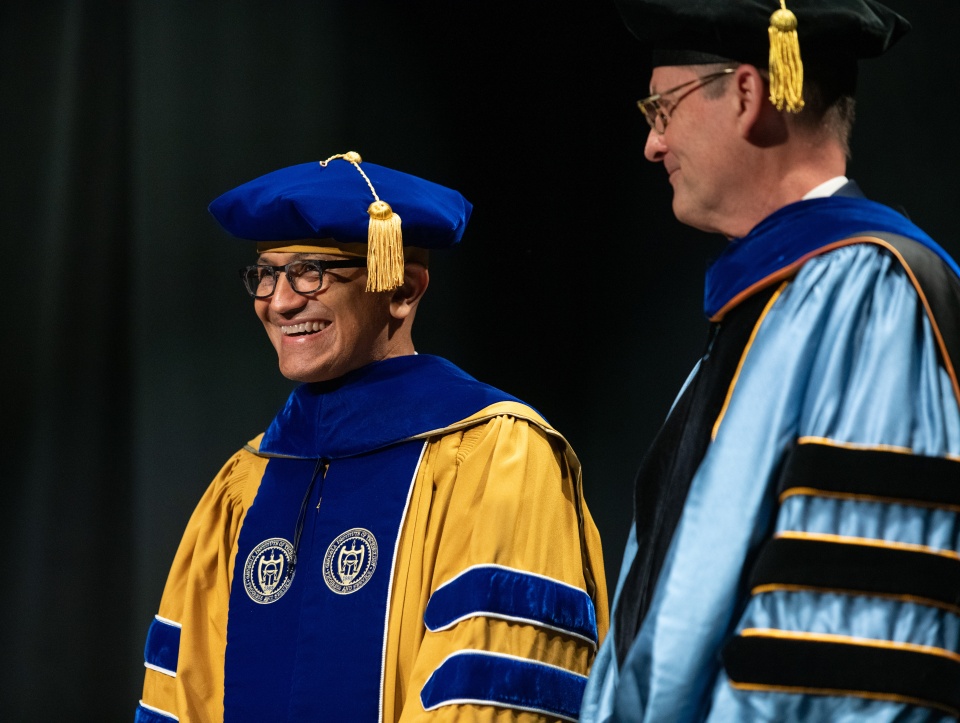On Jan. 24, 2024, Microsoft CEO and chairman Satya Nadella received the distinction of an honorary doctor of philosophy. This is the highest honor that the Institute bestows upon an individual. He is a revolutionist in the tech industry because of how he has enabled Microsoft’s growth during his tenure. From when he took over in 2014, he has helped the company grow from an evaluation of about $300 billion to $3 trillion today. Microsoft is one of only two companies to reach this mark.
During his tenure as CEO, he instilled a culture change that has been a central contributor to the company’s growth. His philosophy included the idea of “mobile first, cloud first” which has led to Microsoft becoming one of the most prominent players in cloud computing.
Microsoft is one of the largest employers of Tech alumni, with over 2,000 former Jackets in their community. Nadella mentioned that, “next to [the University of Washington], Georgia Tech is probably the place where the most folks that work at Microsoft have come from.”
Alex Orso, Interim Dean of the College of Computing, and President Ángel Cabrera each gave speeches on Nadella and Microsoft’s impact on the Institute. Then, President Cabrera and Provost Steven McLaughlin conducted the official ceremony of bestowing the doctorate distinction to Nadella.
After receiving the honor, Nadella gave a speech emphasizing the importance of the innovation and research taking place at Tech. He mentioned the timing of this comes during the “golden age of computer science … [during] one of the most consequential moments in the history of technology.” He added,” “As we enter this age of AI, it’s communities like this one that help create the world we want to live in.”
Following Nadella’s speech, he sat down for a fireside chat with President Cabrera in which he elaborated on the movement.
They began by reflecting on the parallel between the launch of the first web browser, Mosaic, in 1993 and the first anniversary of ChatGPT in 2023. Nadella talked about how the user migration towards artificial intelligence (AI) based search engines will be significant, just like the inception of Mosaic.
The impact of ChatGPT, generative AI and large language models (LLMs) will be twofold. On one hand, Nadella mentioned that it is “fundamentally going to change all user experiences moving forward of computing.” On the other hand, everything has become digitized over the years.
“We now have a new reasoning engine, which is more of a new neural reasoning engine that finds patterns … [making] this like the Mosaic moment.” He went on to say that these two sides will “change every layer of the software stack.”
With the growth of generative AI, many people have had concerns such as whether they may become obsolete. As President Cabrera and Nadella talked on this subject, Nadella brought forth the idea that this is not going to eliminate jobs but rather change the way people work. This can help speed up processes and “drive economic growth and productivity,” he said.
Another area where people are having more questions is the impact of generative AI in the education field. To that, Nadella brought up the idea that this can be one of the best tools for teaching, as it will provide a more personalized way of learning for students. He also emphasized the idea that AI is inevitable, so it is important to find ways to incorporate the tools.
They also dove into the dangers of these new technologies and how prevention is necessary.Nadella spoke about the idea that this movement will require legislative actions to regulate the misuse of AI. He added that it is critical that people have these conversations and allocate the proper resources saying, “That’s a place where institutions like Georgia Tech can do work.”
During the last few minutes of their discussion, Nadella transitioned into speaking about his philosophies on Microsoft’s culture and his leadership.
He talked about the idea that “we should only exist if we’re doing useful, relevant things” and that is a “super grounding, helpful thing.” Nadella said, “The question is what are we going to do tomorrow … instead of being worried and afraid of it you get back in touch with what fundamentally made us successful
like that sense of excitement.”
Nadella then outlined the three attributes of leadership he holds himself to in the workplaceand looks for in others.
The first is the idea of clarity. Regarding clarity, he said, “leaders are fundamentally capable of bringing clarity into any situation where none exists … you want leaders who can come into an ambiguous, uncertain situation and bring clarity.”
The second is the idea of creating a healthy work culture. In relation to this idea, he said, “leaders are people who create energy all around them … that you can really develop and is something you cultivate.”
The third and final attribute is about not waiting around for situations to be perfect. In connection with the Tech community, Nadella said, “in talking to an engineering school, the ability to solve over-constrained problems. That’s what leaders do.”
Nadella and Cabrera concluded the chat by reiterating their enthusiasm for the longstanding corporate and academic relationship between Microsoft and the Institute. He left students with a final message of encouragement for Jackets.
“Our mission as a company is to empower every person and every organization on the planet to achieve more. If you want to come and join a company which is obsessed about making others cool in every part of the world, join Microsoft,” Nadella said.
